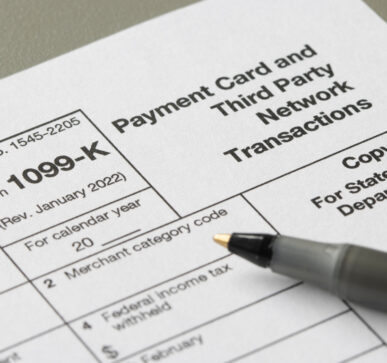As a result of the American Rescue Plan Act of 2021, effective for Tax Returns for the Calendar year 2022, small business that accept payment cards as a form of payment will receive a Form 1099-K for the gross amount of the payments made to them through the use of a payment card during the calendar year. Moreover, if the business accepts payments from a third-party settlement organization, they will receive a Form 1099-K from that organization only if the aggregate amount of payments for goods and services exceeds $600 during the calendar year. These transactions are known as Third Party Network Transactions or Peer-to-Peer (P2P) payment applications such as PayPal and Venmo. The $600 payment provision affects only businesses or entities that accept payment cards or use third party network settlement organizations for payment of goods or services.
The $600 threshold is a notable change from the prior reporting provision requirement of 200 transactions and $20,000. Lowering the threshold to $600 in payments without any regard to the number of transactions can come as a challenge to many small business as well as individuals working in the gig (sharing) economy, online sellers, independent contractors, and other self-employed business owners. Of note, If the business exceeds the $600 threshold, the platform will send Form 1099-K to the business and the IRS in the following year. If the business does not receive a 1099-K, the business is still required to report any business income you receive through these platforms on their income tax return.
Form 1099-K is an IRS information return that is used to report certain payment transactions with the purpose of improving voluntary tax compliance. Form 1099-K is issued by January 31st if, in the prior calendar year, payments are received from:
- Card transactions (debit, credit, or stored-value cards), and/or
- In settlement of third-party payment network transactions above the minimum reporting threshold of $600.
What does Form 1099-K include? IRS states:
The gross amount of all reportable payment transactions from each payment settlement entity from which payments were received in settlement of reportable payment transactions. A reportable payment transaction is defined as a payment card transaction or a third-party network transaction.
- Payment card transaction means any transaction in which a payment card, or any account number or other identifying data associated with a payment card, is accepted as payment.
- Third party network transaction means any transaction that is settled through a third-party payment network, but only after the total amount of such transactions exceeds the minimum reporting thresholds.
- The gross amount of a reportable payment does not include any adjustments for credits, cash equivalents, discount amounts, fees, refunded amounts, or any other amounts. The dollar amount of each transaction is determined on the date of the transaction.
What about Crypto?
Form 1099-K is designed for payment companies and not Crypto Exchanges. Nonetheless, there are some Crypto Exchanges that choose to issue a Form 1099-K. As a result, the form will show gross transaction volume instead of taxable gains and losses. There is no Guidance issued to Crypto Exchanges on which 1099 Form to use to send to their clients. The versions most commonly used by cryptocurrency exchanges are Form 1099-B, Form 1099-MISC, and Form 1099-K.
CoinLedger reported that “If you’re buying and selling cryptocurrency, you might receive Form 1099-DA (Digital Asset) in the near future”.
All Business need to be careful when reporting their income
Business that do not report their earnings correctly and timely put themselves in a potential IRS audit risk situation. Keeping proper books and records, having adequate bookkeeping practices in place, and gathering and organizing information is essential to a Taxpayer under audit. The best way to withstand an Audit is for the Taxpayer to arm himself/herself with information.
What To Do If The IRS Wants To Audit You? Rule #1 is Not to Panic! Contact your CPA immediately and never speak to the IRS on your own. ©





